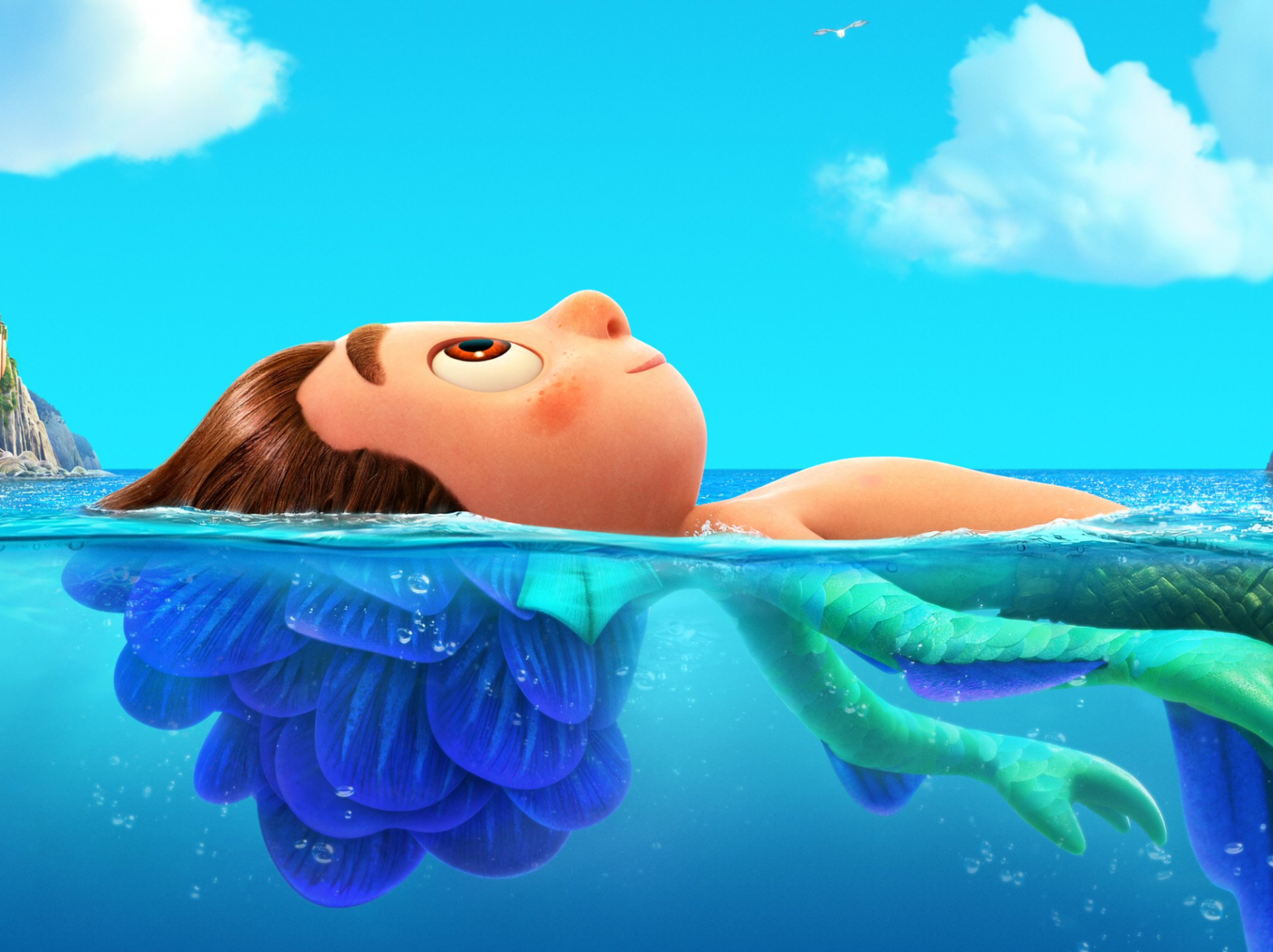The first trailer for Luca sure made it seem like a queer coming-of-age story. Colorful sea monster boys frolicking along the coast of Italy, taking human form on land because society doesn’t accept them, and avoiding water because their true selves show when they’re wet? If it looks like a metaphor and swims like a metaphor, it’s probably a metaphor. But, to my surprise, the movie that looks like Pixar’s Call Me by Your Name is not a metaphor for the queer experience. Or at least it isn’t yet.
Luca begins underwater, the titular character a humble fish herder who has never breached the surface—his parents strictly forbid it, as the humans on land pride themselves on killing sea monsters. But then Luca runs into Alberto Scorfano, a sea monster who spends most of his time on land, and learns a convenient secret: sea monster bodies morph into human bodies when they’re dry. With their built-in disguises at the ready, Luca and Alberto explore the nearby village of Portorosso (a fictional rendition of a Cinque Terra town) and get up to youthful hijinks as their connection deepens.
READ ALSO: Review: ‘Soul’ is an appreciably mournful entry from Pixar
Luca feels less burdened by exposition than some of Pixar’s other recent efforts. Onward and Soul—particularly the latter—were conceptually complex but had to stop and explain themselves here and there, dishing out details about their worlds so that the stories made sense. Luca, on the other hand, slides into its story and setting like a foot into a flipper, ferrying us into the movie’s world with confident nonchalance. Starting some Pixar movies feels like an intro lecture, but starting Luca feels like waking up on a day off. It’s cozy, and there’s no reason to worry about what’ll happen next.
The reason behind Luca’s laid-back tenor is twofold: first, it’s a decidedly low-key, low-stakes movie, and its conflicts stem more from friendship hurdles than from the looming threat of being murdered by the townspeople. Until things get climactic, the “they’ll kill us if they see the real us” factor is mainly played for comedy. Without a central goal established at the outset—like Soul’s journey to resurrection, or, uh, Onward’s journey to resurrection—Luca is free to unfold with a little more structural flexibility. Screenwriters Jesse Andrews and Mike Jones are in no hurry, and they allowed themselves to relax in their world before pushing forward to problems that need solving.
That wiggle room allows for the other reason behind Luca’s lighter tone: the jokes. This is easily one of the more laugh-out-loud Pixar efforts. Thanks to the movie’s looser pace, there’s plenty of space for one-liners and recurring gags, the most eccentric of which being Luca and Alberto’s undying dream to own a Vespa. From what they’ve seen, the little scooter is the ultimate way to traverse the Italian expanse. Pixar has gotten near-limitless mileage out of the “fish out of water” story template—I’d go so far as to call it their primary storytelling vehicle—but they haven’t gotten enough love for how fluently they translate unfamiliarity to comedy.
I suppose the third time Pixar went for a literal “fish out of water” story wouldn’t be their most impressive. For all its idiosyncratic pleasantness, Luca ends up checking the boxes of a standardized, unadventurous fable about acceptance. The film’s bravest addition to that fable—the idea that one of the rejects, seeking approval, might pick up a pitchfork to stand against their own—is a hot topic that’s dropped like a hotter potato. And don’t go looking for a specific angle on the metaphor: Luca isn’t queer, or contemporary, or anything but vague in its messaging, and the characters’ prejudices are overcome without a hitch. This is bedtime story-level depth.
But that’s the intent, even if it’s a bedtime story we’ve been hearing since humanity first grasped the concept of tolerance. Luca’s low-key, dreamy approach extends to its animation, too: ditching the hyper-realism that gives animated fabrics a visible thread count, Luca goes for a smoothed-over look that emphasizes color and facial expression. Compared to the detail of Soul and Toy Story 4, it seems almost impressionistic—an Italian paradise painted from childhood memories. That looseness, whether in structure, message, or animation style, gives Luca a certain malleability. Is the film an ode to Italian culture, like Coco was for Mexico or Disney’s Raya was for Southeast Asia? Not really, but it’s laid-back enough to be; there’s ample time to get lost in the Italian-inspired food and architecture. Is it a queer film? No, but it’s vague enough to be if you want it to.
★★★½ (3.5/5)




